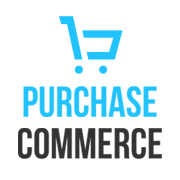Description

Purchase Commerce

Shipway
Comprehensive Overview: Purchase Commerce vs Shipway
Purchase Commerce and Shipway are distinct products that cater to specific needs in the e-commerce sector, and they target different aspects of the online shopping and logistics experience. Here's an overview of each, their functions, target markets, market share, user base, and differentiating factors:
a) Primary Functions and Target Markets
Purchase Commerce
-
Primary Functions: Purchase Commerce typically refers to platforms or solutions aimed at streamlining e-commerce operations. This involves inventory management, order processing, vendor management, and analytics. These solutions are designed to enhance the back-end operations essential for e-commerce businesses to function smoothly.
-
Target Markets: Small to medium-sized businesses (SMBs) are often the target, although larger enterprises may also use these solutions. Businesses looking to digitize their purchasing, manage vendors efficiently, and optimize their supply chain are the primary users.
Shipway
-
Primary Functions: Shipway is a logistics and shipping solution provider primarily focused on post-purchase services, including shipment tracking, notifications, and delivery management. Their services may include tracking integration, automated notifications, customer feedback collection, and returns management.
-
Target Markets: Online retailers and e-commerce platforms that wish to enhance their post-purchase experience. Shipway caters to businesses that prioritize customer satisfaction and wish to maintain transparency in the delivery process.
b) Market Share and User Base
Purchase Commerce
- Market Share and User Base: Purchase Commerce solutions often face competition from more established enterprise resource planning (ERP) systems and niche e-commerce platforms. Their market share can vary widely depending on the specific technology or platform referred to as "Purchase Commerce." Generally, their user base comprises growing e-commerce businesses that do not yet need a full-fledged ERP but require more robust solutions than simple inventory tools.
Shipway
- Market Share and User Base: Shipway often holds a more specialized niche within the e-commerce sector focused on logistics and post-purchase customer interaction. Its user base is more defined compared to general e-commerce management platforms. This includes small to medium-sized online retailers who need comprehensive shipment tracking and customer communication solutions without building these capabilities in-house. Their market share can be quite dynamic given the competitive nature of logistics tech.
c) Key Differentiating Factors
Purchase Commerce
-
Integration and Scalability: Offers integrations with various e-commerce platforms and marketplaces, providing scalability for growing businesses. Their solutions are often modular, allowing businesses to select and pay for only the needed features.
-
Comprehensiveness: These platforms often provide a wider array of business functionalities beyond logistics, including procurement and vendor management, which is ideal for companies looking for a one-stop-shop solution for e-commerce operations.
Shipway
-
Specialization in Logistics: Shipway specializes in shipping and tracking, making it a go-to solution for businesses where delivery experience is crucial for customer satisfaction.
-
Customer Engagement: A focus on post-purchase engagement distinguishes Shipway from more general e-commerce solutions. Their emphasis on notifications and feedback cycles helps businesses enhance customer experiences and retention.
Conclusion: While Purchase Commerce and Shipway operate within the broad e-commerce ecosystem, they serve different aspects of it. Purchase Commerce typically handles the broader operational logistics of e-commerce, focusing on internal business processes. In contrast, Shipway specializes in enhancing the customer-facing logistics and delivery processes. Users might choose based on whether their primary need lies in optimizing business operations or enhancing the customer post-purchase experience.
Contact Info

Year founded :
2014
Not Available
Not Available
India
http://www.linkedin.com/company/purchase-commerce

Year founded :
2009
+92 52 4269191
Not Available
Pakistan
http://www.linkedin.com/company/shipwaylogistics
Feature Similarity Breakdown: Purchase Commerce, Shipway
To provide a feature similarity breakdown for Purchase Commerce and Shipway, let's delve into their common features, user interface comparisons, and unique attributes:
a) Core Features in Common
Both Purchase Commerce and Shipway typically offer features that cater to e-commerce and shipping management needs. Common core features often include:
- Order Management: Both platforms allow businesses to manage customer orders efficiently, providing tools for tracking and updates.
- Inventory Management: Systems to manage stock levels, product catalogs, and warehouse operations.
- Shipping Solutions: Integration with multiple courier services to offer shipping options, tracking, and automated shipping label generation.
- Customer Communication: Tools for notifying customers about order status, shipping updates, and delivery confirmation.
- Analytics and Reporting: Insights into shipping and order performance, helping businesses optimize their operations.
b) User Interface Comparisons
While specific user interfaces can vary based on updates, customization, and version differences, there are some general comparisons:
-
Purchase Commerce: Known for a comprehensive dashboard that integrates various e-commerce functionalities. It's designed to handle a wide array of business operations, which might make it feature-rich but potentially overwhelming for non-technical users.
-
Shipway: Tends to focus on simplicity and ease of use in shipping management, with a clean interface that highlights tracking and communication functionalities. It generally provides a more streamlined experience for users primarily focused on shipping.
c) Unique Features
Purchase Commerce:
- E-commerce Integration: Purchase Commerce may offer deeper integration with various e-commerce platforms, providing an all-in-one solution for managing online sales alongside shipping.
- Advanced Payment Gateways: Options for robust payment solutions that integrate seamlessly with order management, possibly offering more payment options.
Shipway:
- Specialized Tracking: Exceptional focus on real-time tracking solutions, offering detailed tracking updates and notifications that might surpass Purchase Commerce's capabilities.
- Post-Purchase Engagement: Enhanced features for engaging customers after purchase with branding options in notifications and tracking pages.
- Returns Management: Dedicated tools for managing product returns, which might provide more flexibility and control than Purchase Commerce.
Each platform caters to slightly different priorities within the commerce and shipping space, with Purchase Commerce being a broader e-commerce solution and Shipway focusing more on shipping excellence and post-purchase experience. Both can greatly benefit businesses, depending on specific needs in e-commerce operations or specialized shipping solutions.
Features

Not Available

Not Available
Best Fit Use Cases: Purchase Commerce, Shipway
Certainly! Let's delve into each aspect for Purchase Commerce and Shipway:
Purchase Commerce
a) Best Fit Use Cases:
-
E-commerce Platforms: Purchase Commerce is ideal for businesses running online stores that require a comprehensive, scalable solution to manage their digital storefronts, from product listings and inventory management to payment processing and order fulfillment.
-
Retail Chains: Companies with multiple retail locations can benefit from Purchase Commerce's integrated systems, which allow for seamless coordination between physical stores and online operations, ensuring consistent pricing, inventory, and customer experience.
-
Brands with Omni-channel Strategy: Businesses that operate across multiple channels (e.g., online, in-store, mobile) would find Purchase Commerce an excellent fit due to its ability to unify and streamline operations across all platforms.
-
Subscription Services: If a business revolves around subscription-based models, Purchase Commerce supports recurring billing and the management of subscription lifecycles, which is crucial for such operations.
d) Catering to Different Industry Verticals or Company Sizes:
-
Small to Medium Enterprises (SMEs): Purchase Commerce offers scalable solutions that can grow with the business, making it suitable for startups or small businesses planning significant growth.
-
Large Enterprises: With robust features for handling extensive catalogs and high-order volumes, it suits large-scale businesses needing reliable infrastructure and services.
-
Industry Specialization: Vertical-specific capabilities, like managing digital goods, fashion, electronics, etc., are a strong suit, providing tailored functions to meet industry-specific needs.
Shipway
b) Preferred Scenarios:
-
Order Tracking Solutions: Shipway excels in providing real-time tracking solutions, making it ideal for businesses that want to enhance their customer’s post-purchase experience by offering detailed shipment and delivery tracking.
-
Logistics Management: Companies seeking to improve their shipping logistics, including handling different carriers, generating shipping labels, and managing returns efficiently, will find Shipway beneficial.
-
Customer Communication Enhancement: Businesses that prioritize clear, effective communication with their customers regarding order status updates would benefit from Shipway's notification systems through SMS, email, etc.
d) Catering to Different Industry Verticals or Company Sizes:
-
E-commerce Businesses of All Sizes: While particularly advantageous for medium to large businesses with significant shipping operations, its features can also support small businesses aiming to provide superior tracking services.
-
Third-party Logistics Providers (3PLs): Shipway's integration capabilities with multiple carriers and order management systems make it a good fit for third-party logistics providers managing multiple clients’ shipments.
-
Industry Specialization: Any industry that relies heavily on shipping and logistics, such as consumer electronics, fashion, or fast-moving consumer goods, can benefit from Shipway’s services, as efficient and reliable tracking is crucial.
Summary
-
Purchase Commerce is best suited for businesses focused on integrated commerce solutions, be it for online, in-store, or multi-channel sales strategies. It caters effectively to various industry sizes, from SMEs to large corporations, with specific industry customization.
-
Shipway is crucial for businesses aiming to enhance their logistics and customer communication regarding shipping, beneficial across different business sizes, especially those with substantial shipping requirements.
Both tools offer unique value propositions that cater to their specific niche needs, ensuring that businesses can choose the solutions best aligned with their operational goals and customer service strategies.
Pricing

Pricing Not Available

Pricing Not Available
Metrics History
Metrics History
Comparing teamSize across companies
Conclusion & Final Verdict: Purchase Commerce vs Shipway
To provide a conclusion and final verdict on Purchase Commerce and Shipway, let's analyze the two products based on their features, pricing, usability, customer support, and overall performance.
a) Best Overall Value
Best Overall Value: Purchase Commerce
Reasoning: Purchase Commerce offers a comprehensive suite of features that cater to both small and large businesses. It provides robust tools for managing inventory, orders, and customer relationships, as well as strong analytics features. Its versatility and scalability make it suitable for businesses looking to grow and require a platform that can evolve with their needs. Although its pricing might be on the higher side for smaller businesses, the ROI in terms of features and scalability justifies the investment for many users.
b) Pros and Cons
Purchase Commerce:
-
Pros:
- Comprehensive Feature Set: Offers extensive tools for e-commerce operations, including inventory management, customer relationship management, and advanced analytics.
- Scalability: Easily adapts to the growing needs of a business.
- Integration Capabilities: Integrates well with third-party applications for expanded functionality.
- User-Friendly Interface: Despite its complexity, the platform is designed to be user-friendly.
-
Cons:
- Cost: Might be expensive for small businesses or startups.
- Steep Learning Curve: Requires some time for users to fully utilize all features.
Shipway:
-
Pros:
- Specialized in Shipping Solutions: Offers detailed and efficient shipping management tools that streamline the logistics part of e-commerce.
- User-Friendly Design: Simple interface that focuses on ease of use for shipping processes.
- Affordable Pricing: Budget-friendly option for businesses primarily focused on improving their shipping operations.
- Excellent Customer Support: Provides reliable customer service to assist users.
-
Cons:
- Limited E-Commerce Features: Lacks comprehensive e-commerce functionalities compared to a full-fledged e-commerce platform like Purchase Commerce.
- More Suitable for Smaller Businesses: May not scale as effectively for larger enterprises looking for entire e-commerce solutions.
c) Recommendations
-
For Larger Enterprises or Businesses Planning to Scale: Consider opting for Purchase Commerce due to its scalability and comprehensive feature set, which will support both current operations and future growth.
-
For Small to Medium Businesses Focused on Shipping: Shipway can be an excellent choice if the primary concern is cost-effective and efficient shipping solutions. It allows businesses to enhance their logistics operations without a hefty investment.
-
Hybrid Approach: Some users, especially those transitioning to a more comprehensive solution, might benefit from using Shipway initially for its specialized shipping features and then integrating or transitioning to Purchase Commerce as their needs expand.
By considering the unique strengths and target business sizes of each product, users can make an informed decision based on their specific operational needs and growth plans.
Add to compare
Add similar companies



